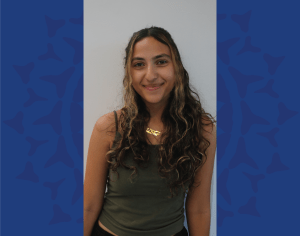By Nicole Shaker •
When I look in the mirror, I see dark brown eyes, dark curly hair and dark, bushy eyebrows. All on tanned skin, close to the color of caramel.
When I look at my job applications, I see white, Black, American Indian, Asian and Native Hawaiian. All alongside empty checkboxes.
When I look in the mirror, I do not see a white person. But when I fill out my job applications, I check off the first box.
As an Egyptian person, I am North African. Middle Eastern and North African people are considered white, according to the U.S. government. However, we are often not white-passing, and thus often do not receive white privilege.

Nicole Shaker, writer for The Current.
That is why it confuses me that my fellow Middle Easterners and North Africans are grouped in with this population that is so culturally and physically distinct. My Arabic-speaking family still gets unnecessarily scrutinized at airports, and my sisters’ thick, unruly hair only tames with products by Black and Arab-owned businesses.
I don’t mind the labels as much as the principle. It feels like my peoples’ history and identity are stripped away and ignored whenever I look at those checkboxes on my job applications. We are our own people, rich with tradition and culture. We are our own identity, not an afterthought to be grouped in with the first race listed.
Right now, Middle Easterners and North Africans are invisible. Look at virtually any published study examining the effect of an issue on social populations. We are never our own category.
When issues like illnesses, homelessness and access to education are studied, people can observe disproportionate effects on minorities like American Indians, for example, and thus advocate for appropriate policy. But because Middle Easterners and North Africans are never represented as their own category, we can never know our place in national problems, in which we could very well be disproportionately affected.
This feels unfair. I know putting “white” on my job applications is probably only helping me in this society we live in, and I probably don’t have any right to complain, but still, I feel I have to bring attention to this thing that makes no sense. I feel like this racial label that has been put on me is a lie.
I don’t know how jobs would look at me differently if I checked off the theoretical “Arab” box. But I want this box to exist, for people like me with brown skin and dark features and an identity that is so much deeper than many know.
Nicole Shaker, senior double major in computer science and communication with a concentration in journalism, serves as the co-editor-in-chief of The Current.

Be the first to comment on "I’m white, I guess?"